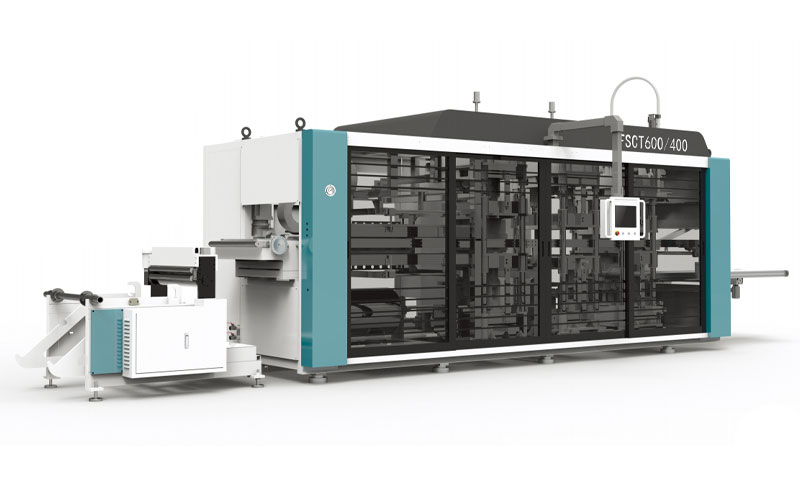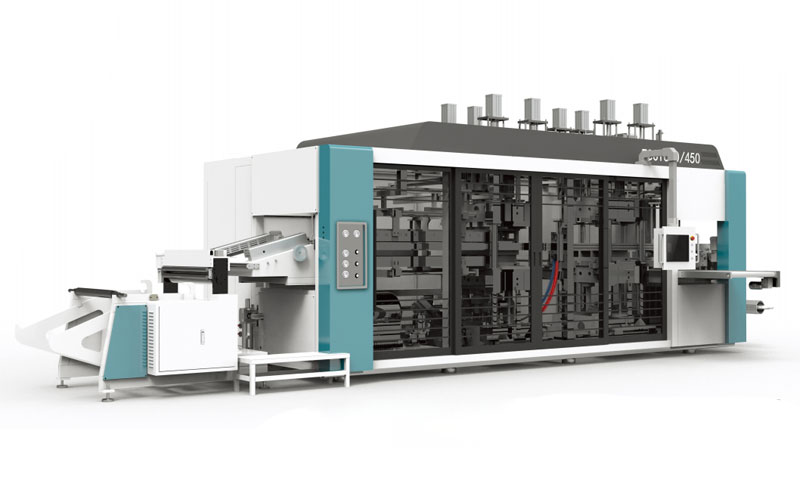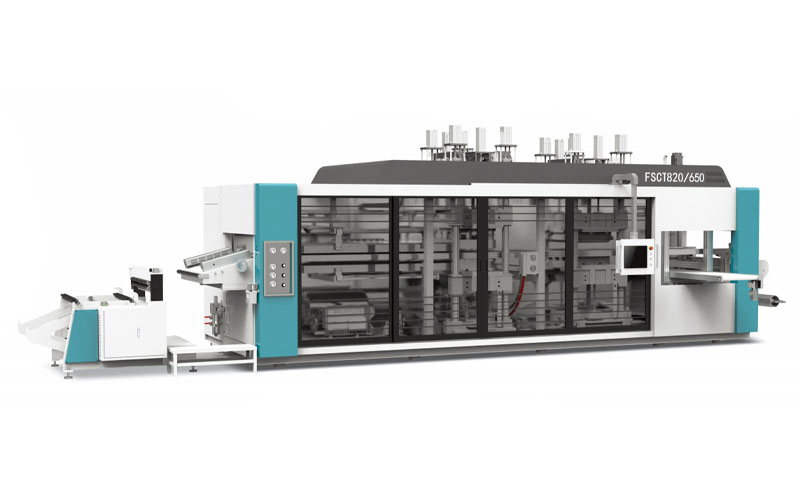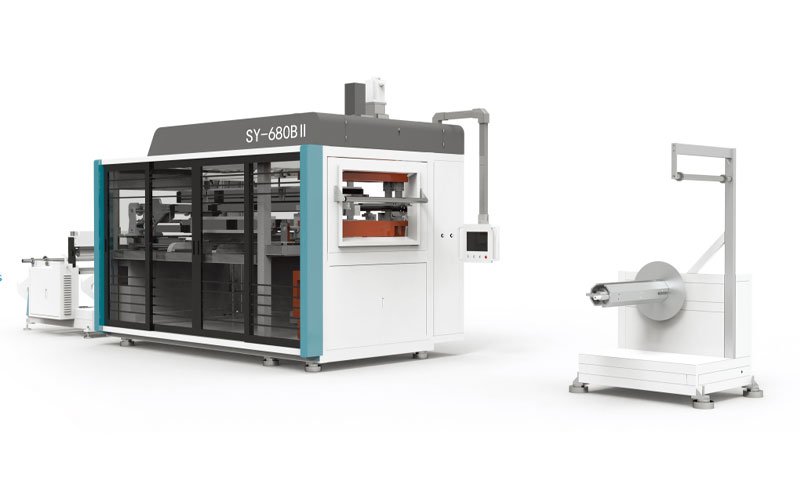Plastic cups are commonly used across a wide range of industries, from food and beverage packaging to medical and cosmetic applications. The rise in consumer demand for disposable cups, especially for beverages, has led to significant innovations in manufacturing processes. One of the key players in the production of these cups is the plastic cup making machine, which offers efficient, automated solutions for high-volume production. This article will provide an overview of the plastic cup making machine, how it works, and the benefits it brings to manufacturers.
1. What is a Plastic Cup Making Machine?
A plastic cup making machine is a specialized piece of equipment designed to produce plastic cups in various shapes and sizes. These machines are capable of transforming plastic sheets or pellets into finished cups through a series of processes, including heating, molding, and shaping. The machines typically use thermoforming, injection molding, or extrusion techniques, depending on the type of cup being produced.
*Thermoforming Machines: These machines use heat to soften a plastic sheet, which is then molded into the desired shape of a cup using a mold. The plastic is cooled, cut, and removed from the mold.
*Injection Molding Machines: In this process, plastic pellets are heated and injected into a mold, where they take the shape of a cup before being cooled and ejected.
*Extrusion Machines: Plastic material is melted and extruded through a mold to form a continuous tube or sheet, which is then cut into individual cups.
2. Key Features of a Plastic Cup Making Machine
High Automation: Most plastic cup making machines are fully automated, which allows for high-speed production with minimal human intervention. Automated features often include automatic loading and unloading of raw materials, precise temperature controls, and real-time monitoring of production output.
Versatility: These machines can produce various types of cups, ranging from simple disposable drink cups to more complex designs like insulated cups, tapered cups, or cups with lids. The machines can also handle different types of plastics, such as PP (Polypropylene), PS (Polystyrene), PET (Polyethylene Terephthalate), and PVC (Polyvinyl Chloride), depending on the machine specifications.
High Efficiency: With the ability to operate at high speeds (producing thousands of cups per hour), these machines significantly improve production efficiency, which is essential for meeting the demand in industries like foodservice, retail, and beverage manufacturing.
Customization: Plastic cup making machines often allow for customization of the cup designs, including embossed logos, graphics, or different cup sizes, which adds to the product’s appeal.
Energy Efficiency: Modern machines are designed to reduce energy consumption, improving sustainability and reducing operational costs.
3. Working Principle of Plastic Cup Making Machines
The operation of a plastic cup making machine depends on the type of machine used, but the general process follows a few common steps:
Material Feeding: Plastic materials, either in the form of pellets or sheets, are fed into the machine. The raw material is typically stored in hoppers or extruders.
Heating: The raw plastic material is heated to a high temperature (using electric heaters, for example) to make it soft and malleable. For thermoforming, the plastic sheet is heated to a specific temperature where it becomes soft enough to be molded.
Molding: The heated plastic is then molded into a cup shape. In thermoforming, this involves stretching the soft plastic over a mold and applying pressure to create the cup's shape. In injection molding, the plastic is injected into a pre-designed mold cavity where it solidifies into a cup shape.
Cooling and Ejection: After molding, the cup is allowed to cool and solidify, making it rigid. The finished cups are then ejected from the mold.
Trimming and Quality Control: Any excess plastic material is trimmed from the edges, and the cups are inspected for quality. This includes checking for defects such as cracks, bubbles, or uneven molding.
Packaging: Once the cups are inspected and trimmed, they are stacked and packaged for shipment or storage.
4. Advantages of Plastic Cup Making Machines
Speed and Efficiency: These machines can produce a large volume of cups in a short period, which is crucial for industries with high demand for disposable cups, such as beverage companies, coffee shops, and fast-food chains.
Consistency in Quality: The automation and precision in these machines ensure that each cup produced meets the same quality standards, with minimal human error.
Cost Savings: High production speed and reduced labor costs make plastic cup making machines a cost-effective investment for businesses. Additionally, these machines are designed to minimize material waste.
Flexibility: Manufacturers can easily switch between different types of cups, materials, and sizes without significant changes in the production process. This allows businesses to quickly adapt to changing consumer demands.
Sustainability: While plastic cups are not generally seen as environmentally friendly, advancements in machine technology have enabled the use of biodegradable plastics and recyclable materials, helping manufacturers move towards more sustainable practices.
5. Applications of Plastic Cup Making Machines
plastic cup making machine is used in a wide range of industries:
-
Food and Beverage: These machines are commonly used to produce disposable cups for soft drinks, coffee, tea, and other beverages.
-
Medical and Pharmaceutical: Plastic cups are used for measuring medicines, packaging pills, or even as part of diagnostic kits.
-
Cosmetics and Personal Care: Cups are used for packaging lotions, creams, or sample products.
-
Event and Catering: Disposable cups are also commonly used in catering services, weddings, parties, and other events.
6. Considerations When Choosing a Plastic Cup Making Machine
When selecting a plastic cup making machine, consider the following factors:
Production Capacity: Choose a machine with the right output speed and volume that meets your business’s production requirements.
Material Compatibility: Ensure the machine can handle the type of plastic you plan to use (e.g., PP, PS, PET).
Machine Size and Footprint: Consider the space available in your production facility to determine if the machine will fit.
Maintenance and Support: Choose machines from reputable manufacturers that offer reliable after-sales service, spare parts, and maintenance.
Cost of Ownership: Evaluate the initial investment, operating costs, and potential for cost savings through automation and material efficiency.
Conclusion
The plastic cup making machine is an indispensable tool for manufacturers producing disposable cups on a large scale. Offering high speed, efficiency, and versatility, these machines enable businesses to meet the increasing demand for plastic cups across various industries. By automating the production process, these machines not only reduce labor costs but also ensure consistency and quality. For any business involved in high-volume cup production, investing in a plastic cup making machine is a wise choice that can lead to significant benefits in terms of productivity, cost-effectiveness, and scalability.







